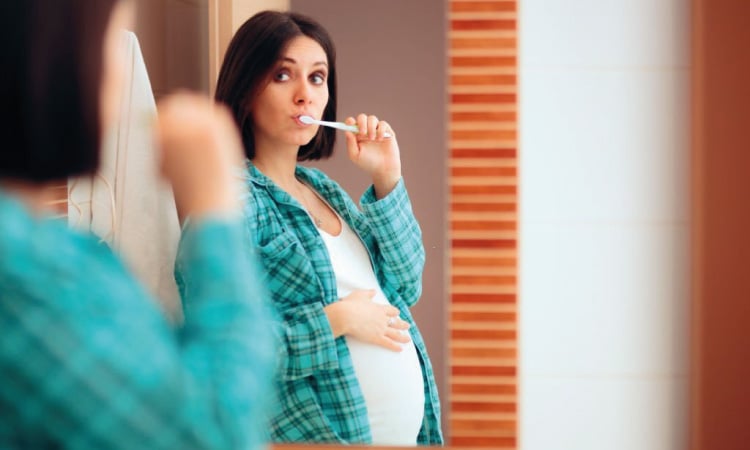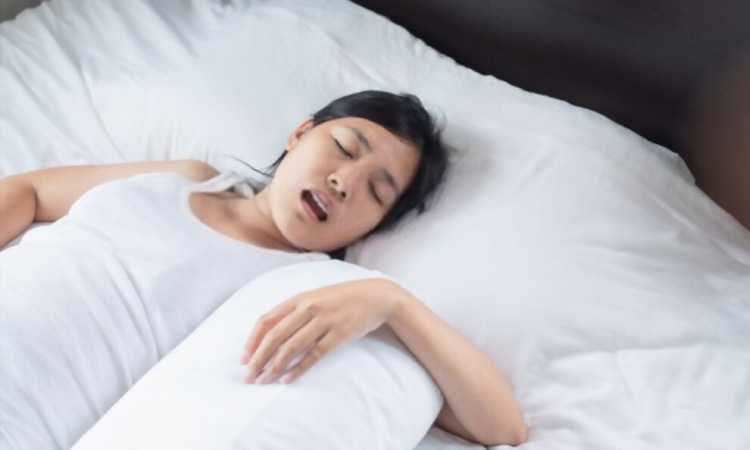Expecting the unexpected is what we all know about pregnancy and that’s how we women gear up ourselves for the upcoming nine months. But there could be a few probably untold or unexpected pregnancy symptoms that no one informed us about — something like drooling while sleeping during pregnancy.
Little did we know that excess saliva has been named as a condition known as ptyalism where you make too much saliva than usual. This is also known as hypersalivation or sialorrhea, which commonly affects women in the early stages of pregnancy. Though this isn’t a serious condition affecting your baby or your pregnancy, this could make you upset and uncomfortable.
In this article, we give you more insight about drooling in sleep in late pregnancy and what causes too much saliva during pregnancy.
What Is Drooling?
The inadvertent flow of saliva from the mouth is known as drooling. It is usually because of too much accumulation of saliva due to weak or underdeveloped muscles around the mouth. Salivary glands are responsible for making saliva. At the bottom of your jaw, on your lips, and near your front teeth, there are six of these glands.
These salivary glands take in 2 to 4 pints of saliva a day. When the salivary glands produce too much saliva, you can experience drooling. Sometimes people produce more saliva than they could swallow. Drooling while sleeping during pregnancy can happen when the saliva collected within the mouth drips or flows past the lips instead of being swallowed.
Related Reading: 9 Home Remedies For Bitter Taste In Mouth During Pregnancy
What Causes Drooling While Sleeping During Pregnancy?
Our panel gynaecologist Dr Ankita Patel Tayal says, “Just like we blame hormones for many changes happening in pregnancy, excess saliva causing drooling while sleeping during pregnancy is also one of them.” Excessive drooling can start about two or three weeks after you conceive. A few believe that excess saliva production is the body’s way of protecting the mouth, throat, and teeth from the corrosive effects of stomach acid.
For those worrying: “is it normal to drool in your sleep while pregnant”, the answer is yes. This is because the nerves that control the salvation process get stimulated more than usual. Though this condition usually fades away by the second trimester, for a few, they might continue drooling in sleep in late pregnancy too.
Calculate Due Date With LMP
While drooling while sleeping during pregnancy is not harmless, you may wake up at night due to excess drooling, or find it hard to swallow your saliva because it makes you feel nauseous.
A few common causes include:
1. Nausea and heartburn
It is believed that pregnant women with nausea (pregnancy sickness) and severe sickness (hyperemesis gravidarum) experience more salivation. Pregnant women also experience heartburn which is a common condition during pregnancy. This is also one reason for pregnant women to drool.
Related Reading: 12 Simple Ways to Prevent Pregnancy Nausea
2. Gastrointestinal Reflex disorder (GERD)
The food intakes in the stomach are pushed up in the esophagus during the later stages of pregnancy. This is because the babies find a way of accommodating themselves in the womb. This leads to a bad irritating and burning sensation causing drooling in sleep in late pregnancy.
Due to the reflex, the esophagus causes the glands to produce more saliva to soothe the stomach acid and burning sensation. Also, this GERD can cause dysphagia (difficulty swallowing) which could lead to the accumulation of more saliva.
3. Sleep position

Have you ever thought about the importance of the sleeping position for yourself rather than the baby in the womb? Sure, sleep deprivation is common during pregnancy, but the position you sleep in is a factor that causes drooling while sleeping during pregnancy, thereby answering your question on what causes too much saliva during pregnancy.
People sleeping on their sides or their stomachs are likely to drool more. Also, people having narrow sinus passages, and those breathing through the mouth are commonly experiencing this.
4. Blocked sinus
Nasal congestion due to a cold or infection could lead to mouth breathing, causing drooling while sleeping during pregnancy. While this could be temporary, a blocked or narrow sinus passage could lead you to drool permanently making you breathe through the mouth always.
5. Dysgeusia
Sour saliva during pregnancy is common due to a condition known as dysgeusia. In this, the pregnant women experience abrupt changes in their taste buds which feel like sucking coins or nails causing sour saliva. This is usually caused by pregnancy hormones which even makes you dislike your favorite food.
Related Reading: Snoring During Pregnancy-Causes, Signs And Tips To Prevent
How Can I Stop Drooling During Pregnancy? 7 Tips
Pregnancy can make you experience a lot of things, whose variations and frequency differ from person to person. But one common thing accepted by all pregnant women is that these experiences are unpleasant. A particularly bothersome symptom is drooling while sleeping during pregnancy.
Tolerating excessive or thick saliva during pregnancy can be unexpected and could also upset you in many ways causing a lot of discomforts. The amount of saliva produced is noticeably more than “normal”. Those dealing with this would either use a tissue to wipe away excess saliva or may find it nauseating.
Here are a few tips that could help you deal with tacking drooling while sleeping during pregnancy.
1. Rinse with mouthwash
Using mouthwash helps you to deal with the excess saliva accumulation in your mouth. An alcohol-free mouthwash will help in removing the leftover acids and bacteria that are a primary cause for saliva accumulation. In turn, they also improve your oral health and keep your mouth healthy. Maintaining a healthier mouth is a must in case you have too much saliva. Using mouthwash helps keep the saliva moving.
2. Brush and floss daily

When you are dealing with drooling while sleeping during pregnancy, it is vital to brush and floss your teeth daily. Though this is a part of daily oral hygiene, doing this regularly helps to remove the acid accumulation that is caused due to frequent nausea and morning sickness you experience during pregnancy.
3. Eat small and frequent meals
When there is excess drooling happening during pregnancy, the best way to make use of the saliva is to use the excess by eating small and frequent meals. Instead of having the routine of three meals per day, try splitting the meals and eating five times a day. Try to avoid intake of foods that could make you feel nauseated. Also, remove carbohydrate and starchy-based foods from your diet.
Related Reading: 21 Pregnancy Superfoods To Include In Your Pregnancy Diet
4. Drink plenty of water
Drinking plenty of water helps to keep you hydrated, making you escape from that unpleasant feeling of drooling. Your muscle activities slow down when you are asleep, thereby reducing the production of saliva. Staying well hydrated during pregnancy could also reduce saliva production. Make sure you drink about 2-3 liters of water every day and have a bottle of water at night beside your bed to quench your thirst.
5. Visit a dentist
Plan for a dentist visit which will help to ascertain if drooling while sleeping during pregnancy is because of any infection that is present in the mouth. Certain gum infections could lead to excess saliva production. Your doctor will also check if you might require a mouthguard to reduce drooling while sleeping during pregnancy. While generic mouthguards are available over the counter, your dentist will examine your condition and might suggest custom-fit mouthguards that may be more comfortable to your mouth.
6. Change your sleeping position
If you are a person sleeping on the side or your stomach, it is easy to find a fix to your drooling problem. The simple solution is switching to sleeping on your back, especially in your first and early second trimesters. This is associated with gravity as the drooling usually happens when your mouth is angled downwards. If you want to sleep on your back, consider changing to a comfortable mattress.
While the mentioned ones may not sound comfortable for pregnant women, this technique could be the best way to start a remedy for drooling while sleeping during pregnancy. You can also place a pillow underneath your knees to ease tension on your lower back.
7. Choose the right pillow
Whether you are a side sleeper or back sleeper, choosing the right pillow could make a huge difference. A simple way to stop drooling while sleeping during pregnancy is to change your sleeping pillow by your sleeping position.
Conclusion

It may be embarrassing to find your pillow all wet after you wake up from your sleep. It could also be you wipe your mouth and wonder why you drool while sleeping during pregnancy. Drooling is common among pregnant women and is not something to be embarrassed about.
Excessive production of saliva may not always be related to a medical condition. Sometimes, it indicates you had a good sleep so you just start to drool. So the next time you wake up from a good dream and discover saliva streaks on your pillows, be glad that you had a relaxing sleep.
Having said much, in the end, you are the best judge if your drooling is harmless, or it could be a sign of something to be tested. Things such as health, lifestyle, and medical history also play an important role in deciding whether the degree of drooling is concerning or not.


